More than two years into war, Granite Staters continue to travel to Ukraine to provide aid and teach philosophy
|
Published: 04-14-2024 12:06 PM
Modified: 04-14-2024 7:31 PM |
It will take Brian Nolen and his 10-year-old springer spaniel, Annie, at least four days to travel from their home in Bedford, New Hampshire to Kharkiv, Ukraine.
The five-leg trip – Nolen’s sixth to the country since the war broke out in February 2022 – began Sunday with an overnight flight from Newark to Rzeszów, Poland. From there, they will drive to the border town of Przemysl, cross into Ukraine, take an overnight sleeper train to Kyiv, spend a night there, and then drive another six hours to Kharkiv.
The city approximately 90 miles from the war’s front will become home for Nolen and Annie for the next six months. Nolen, the co-founder of the aid organization NH4Ukraine, began traveling to the country in May 2022, typically for about a month at a time. He is now embarking on his longest trip yet – and the first with Annie in tow.
More than two years since Russia invaded Ukraine and long after headlines about the war have receded and more recently been replaced by those out of Gaza and Israel, Nolen is one of several New Hampshire residents who continue to return to the country under attack in eastern Europe to deliver aid or teach university students there.
Josh Duclos, a Concord native and a humanities and philosophy teacher at the St. Paul’s School, traveled in March for the third time to Lviv, in western Ukraine, where he volunteered at a soup kitchen in the mornings and co-taught a philosophy seminar to students at Ukrainian Catholic University in the afternoons.
Susan Mathison, a Plymouth resident and the co-founder of the aid organization Common Man for Ukraine, returns to Ukraine for the ninth time on Monday. Her organization has raised $3.5 million to provide food, generators, and sleeping bags to displaced children and families in the country.
Nolen and Duclos are motivated by what they describe as a fundamental revulsion to Russia’s attack and a sense that they can’t sit idly by and watch history repeat itself.
“I’m a bit of a World War II history buff and it reminded me so much of when Nazi Germany invaded Poland in 1939,” Nolen said in an interview last week about Russia’s initial invasion. “This type of thing was supposed to have been a remnant of the past.”
Article continues after...
Yesterday's Most Read Articles
 Bill to allow ‘no fault’ evictions makes it to governor’s desk
Bill to allow ‘no fault’ evictions makes it to governor’s desk
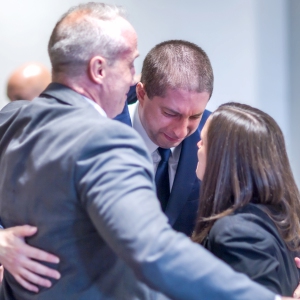 ‘He’s coming home’: Jury acquits former prison guard Matthew Millar in murder trial
‘He’s coming home’: Jury acquits former prison guard Matthew Millar in murder trial
 Look, up in the sky! It’s… an Airstream trailer?
Look, up in the sky! It’s… an Airstream trailer?
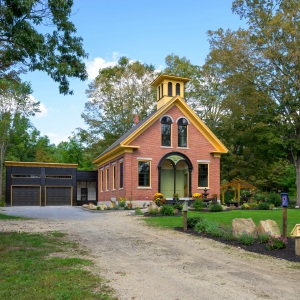 Around Concord: Living in an 1856 schoolhouse is (mostly) delightful
Around Concord: Living in an 1856 schoolhouse is (mostly) delightful
 Slots and no bet limits: State budget shakes up New Hampshire’s casino landscape
Slots and no bet limits: State budget shakes up New Hampshire’s casino landscape
 ‘Deep flavor’ – New restaurant in downtown Concord offers creative spin on comfort food and cocktails
‘Deep flavor’ – New restaurant in downtown Concord offers creative spin on comfort food and cocktails
Mathison, in contrast, is driven by a sense of basic humanity and a desire to do the most good.
“I didn’t know where Ukraine was on a map two and a half years ago,” she said. “We just knew that they were people just like us living in small towns just like us who suddenly found themselves in a war.”
When the war started, Nolen, now 62, was a semi-retired construction business owner. Disgusted by what he described as a “raw land grab” by Russia, he began donating to aid organizations but felt that support was inadequate.
“I just had to get over there and help on the ground,” he decided.
Less than a month after the war began, Nolen bought a plane ticket to Germany and planned to head from there to a 1,500-bed refugee center in eastern Poland.
A day before leaving, Nolen got a call from a friend in New Hampshire, John Fitzgerald. Nolen told Fitzgerald about his plan, and a few days after arriving in Przemysl, Poland, Fitzgerald met him there.
During their three weeks at the refugee center, the pair raised $60,000, which they used to buy janitorial and sanitary supplies including sheets, pillowcases and fingernail clippers.
Since that trip, Nolen and Fitzgerald have established a nonprofit and traveled to Ukraine five times, staying for about a month each time. At first, they rented vans and supplied refugee centers in the west of the country with food and hygiene products. On their third trip, they began to travel east, dropping supplies in small towns and cities across the region.
Nolen’s and Fitzgerald’s days are long. At 7:30 a.m., they arrive at a wholesale warehouse in Kharkiv, “a Costco on steroids,” Nolen said; over the next two hours, they load up the van with supplies, a process that is sometimes disrupted by air-raid sirens; then they drive one to three hours to their destination for the day, unload the van, and have lunch and coffee with the townspeople; finally, they turn around and drive back to Kharkiv, arriving at around 9 p.m. They get some sleep and do it all over again the next day.
“It’s a really unsustainable life because you’re eating a lot of chicken, burgers in gas stations along the way,” Nolen said. “Not the healthiest diet and not much exercise because you’re sitting in the van.”
Fitzgerald will not be going on the upcoming trip, and Nolen said he will have to make some changes to the routine to persist for all six months.
Since May 2022, he has spent approximately 130 days in Ukraine, traveling closer to the war front than most Westerners and other aid organizations dare.
In Kharkiv last January, Nolen was awoken by missile strikes nearly every night – blasts he described as “a very distinctive kaboom.”
“That rattles your cage a little bit, but you just try to go back to sleep and hope the next one doesn’t have your name on it,” he said.
Nolen has delivered aid to Nikopol, across the Dnipro River from the Zaporizhzhia Nuclear Power Plant, which was occupied by the Russians in March 2022. He has entered a secured area to bring medical aid to Ukrainian soldiers, who invited him to watch a live artillery strike on Russian soldiers via drone footage.
“A Ukrainian shell made a direct hit on these guys,” Nolen said. “They were vaporized.”
Nolen is not numb to the danger of the work he does, but he sees it as a calculated risk worth taking.
“There’s still tens and tens of thousands of people living every day in Kherson carrying on normally,” he said. “We can go in there for two or three hours and do a drop and odds are very high, nothing’s going to happen to you.”
At least for now, his trips will continue for as long as the war lasts.
“The more time you spend there, the harder it gets not to go back,” Nolen said. “You meet more and more people over there, and you see their resolve to prevail in the end. You don’t want to abandon them in their time of need.”
Like Nolen, Josh Duclos traveled to Eastern Europe in March 2022 to offer aid to the influx of Ukrainian refugees flowing in. Duclos already had a connection to the region, having served as a Fulbright Scholar in the Czech Republic and having read a lot about 20th-century European politics.
“It’s the first time in my life I have felt myself living in history,” Duclos said. “I had just an overwhelming compulsion that I couldn’t stand on the side.”
In Prague a month after the war began, Duclos supported resettlement efforts for several days. Five months later, he traveled to Lviv, where he taught free English and philosophy lessons.
Duclos has returned to the city 60 miles from Poland twice more, once in March 2023 and again last month. On both trips, which lasted about 10 days, he volunteered to teach philosophy at universities in Lviv and serve at a soup kitchen that makes dehydrated meals.
Last month, Duclos co-taught a four-day seminar called “Utopia, Dystopia, and Democracy” for approximately 25 undergraduate and graduate students at Ukrainian Catholic University. The seminar’s readings included “1984”, “Brave New World”, and Hannah’s Arendt’s “The Origins of Totalitarianism”.
When an air raid siren interrupted the seminar, the class would relocate to an underground shelter and carry on. But otherwise, the ongoing war came up shockingly infrequently in the class’s conversations, Duclos said.
“One of the things I found interesting is how little they actually want to talk about it,” Duclos said. “It’s actually been remarkable how much they just want to do philosophy.”
In addition to teaching, Duclos spends several hours each day at the kitchen, often peeling beets or potatoes for hours.
Unlike NH4Ukraine and Common Man for Ukraine, Duclos doesn’t heavily fundraise for or even talk much about his trips. Of the friends he has told, reactions have varied and have not always been wholly supportive.
“I have a lot of friends on the right and a lot of friends on the left,” Duclos said. “What was stunning was actually the sort of absurd reactions from people on both sides.”
Some on the left have criticized him for “overvaluing White pain”, while some on the right have called him an “idiot” and suggested he was a “George Soros stooge.” But, Duclos said, he has also received a lot of support from many colleagues, friends and family members.
Despite the politicization of the war, Duclos remains steadfast that traveling to Ukraine matters.
“I think Putin is far more globally dangerous than people understand,” Duclos said. “I didn’t feel comfortable staying home and just hoping Washington did something about it.”
On the morning Russia invaded Ukraine in February 2022, Susan Mathison was drinking coffee with her partner, Steve Rand, and their friends, Lisa Mure and Alex Ray, residents of Holderness.
“We looked at each other aghast,” Mathison said. “And we knew we wanted to do something, but we didn’t know what to do.”
Ray, the owner of the Common Man restaurant chain, suggested they travel to Ukraine to see how they could help – an idea Mathison acknowledges sounded “preposterous.”
Rand and Ray, members of the Rotary Club of Plymouth, contacted rotary clubs in Poland and Ukraine. Four weeks later, the group flew to Poland, where they met refugees and ultimately traveled into western Ukraine.
They recognized a dire need for aid for children who had fled eastern Ukraine and resettled elsewhere in the country, often without their families – a group Mathison said numbers 2.5 million.
Upon returning from their first trip, Mathison, Ray, Mure and Rand co-founded Common Man for Ukraine, a humanitarian organization that is now staffed by over one hundred volunteers and has delivered approximately three million meals to Ukrainian children.
Twice per month, a caravan of trucks from Poland delivers food, sleeping bags, and generators to “safehouses” across the country. Once every two months, Mathison and her co-founders travel there, as well.
On Monday, they will fly from Boston to Warsaw, Poland. From there, they will go to Chelm, Poland, where the organization has rented a large warehouse. They will load their trucks, before crossing into Ukraine and traveling to Odessa and Mykolaiv, in the southwest of the country. The drive takes two-and-a-half days.
Common Man for Ukraine also runs a three-week retreat for Ukrainian children whose family members have died in the war, which has been attended by about 700 participants. The retreat, held in Zakopane, Poland, allows the children to “take a deep breath,” according to Mathison.
“For many of these children, it’s the first time in two years that they can sleep through the night without air raid sirens and bombings,” she said.
As coverage of the war has dwindled, Common Man for Ukraine’s fundraising has become more of a challenge and their warehouses are running low on food. They need to raise about $100,000 per month to sustain the amount of aid they’re providing, Mathison said.
The drop in financial support comes amid worsening conditions on the ground, according to Mathison.
“They are desperate there,” she said. “Things in Ukraine are not good.”
Like Nolen, Mathison is committed to continuing her organization’s work until the war ends.
“These kids in Ukraine are being brave every single day for more than two years,” she said. “I feel like I am compelled. I must be brave like them. I must be strong like them.”
To make a donation to Brian Nolen’s organization, NH4Ukraine, visit its website here: https://www.nh4ukraine.org/. To make a donation to Susan Mathison’s organization, Common Man for Ukraine, visit its website here: https:// com mon man forukraine.org/.

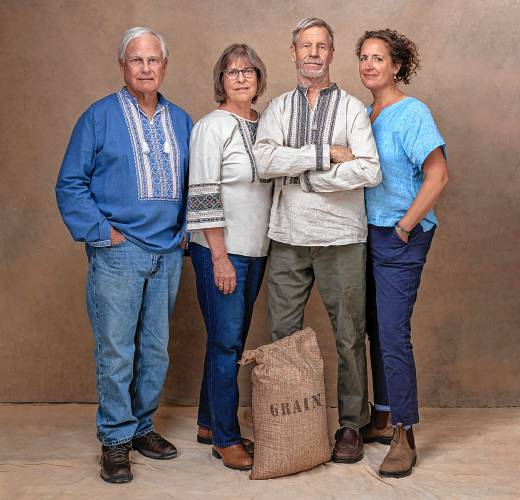
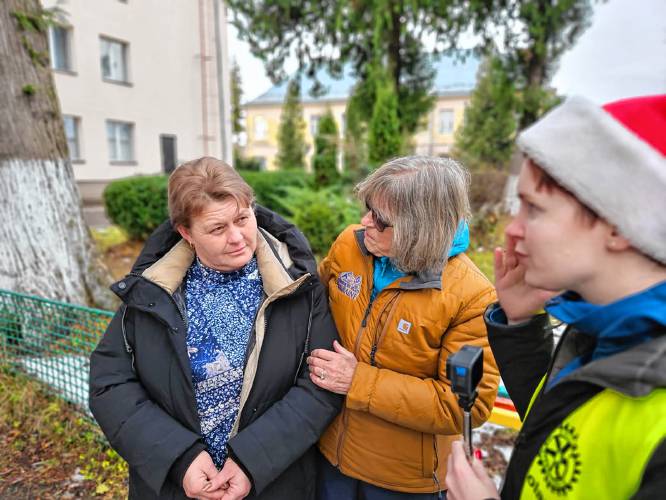
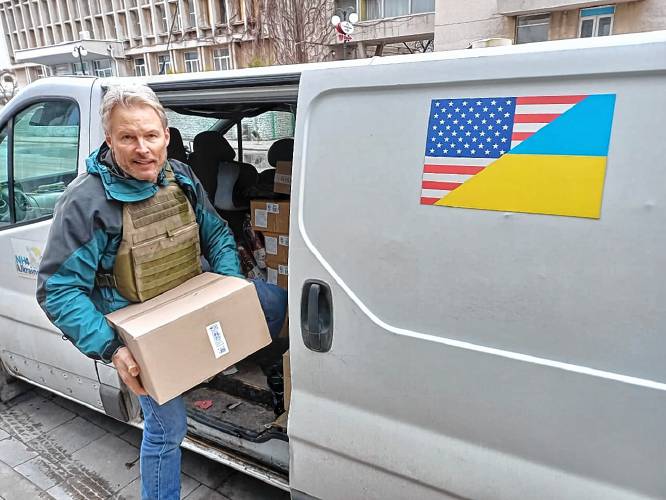
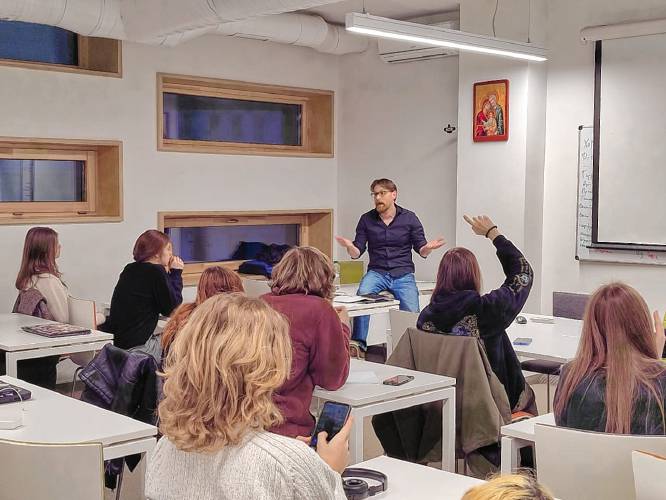
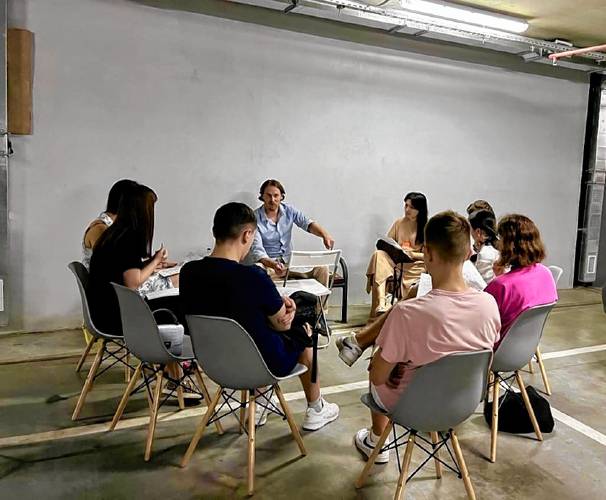






 Celebrating independence: A list of local July 4 celebrations
Celebrating independence: A list of local July 4 celebrations Around Concord: Over The Moon Farmstead brings mead, beer, pizza and music to Pittsfield
Around Concord: Over The Moon Farmstead brings mead, beer, pizza and music to Pittsfield Around Concord: The Balshaws bring a rustic revival to the Canterbury Country Store
Around Concord: The Balshaws bring a rustic revival to the Canterbury Country Store
